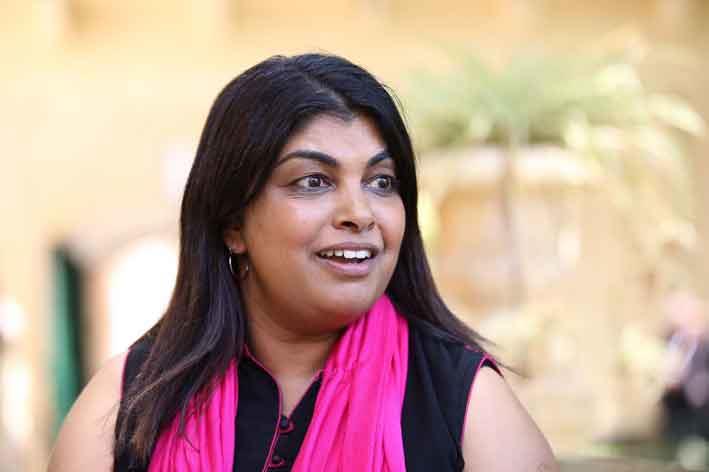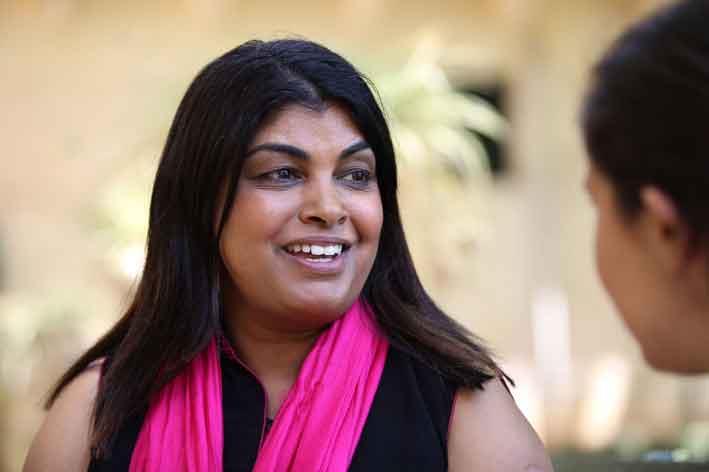Rani Hong, a 46-year-old American citizen who was born in India, has gone from victim of child slavery to a United Nations special advisor on combatting modern day slavery. Above and beyond her work with the UN, Hong was also instrumental in creating a platform for victims to speak out.
She has launched an initiative known as the ‘Freedom Seal’, something companies can earn should they meet the criteria required to ensure that abusive migrant labour practices are a thing of the past, and was also successful in convincing the UN to launch a World Victims Day, celebrated on 30 June.
Hong was speaking at a conference on sharing models and best practices to end modern day slavery and restore dignity to victims. President Marie-Louise Coleiro Preca and a number of experts in the field addressed the event, which was organised by the Amersi Foundation and the President’s Foundation for the Wellbeing of Society
How did this all start?
I am based in Seattle-Washington. My offices are there but I work all over the world and have visited 25 countries in the course of my work. It is amazing now to be here in Malta for the first time and Iam grateful for the opportunity that the foundation, the global sustainability network and the presidency foundation have created.
So I was a seven year old child living in South India. I was very happily living with my mum and dad, and one day I was suddenly kidnapped and stolen from my mother. I was taken into slavery into a separate state. Nobody knew me, I couldn’t speak the language and I was very disorientated.
I do not have much memory of this, traffickers prey on vulnerability and innocence. During the process, they abuse and torture as a way to control, it’s called seasoning for submission.
This is what happens to a child who is going through the trafficking process. In my case that’s what happened and it led me to completely shut down and became dysfunctional.

And how did you end up living in America?
So the traffickers said this child cannot work anymore. My owner was using children to work, and was selling children left and right. He was an employee of a cement company, and was using children for services. In my case I looked destitute and dying so they wanted to get rid of me. While they wanted to get rid of me they also wanted to make one last profit, so they sold me into international adoption through illegal channels.
They sold me into Canada and then into the USA. Today, I speak for those without a voice. Millions of children cannot stand up and speak out, not just because of their age alone but also because they had no platform to do this.
Today, under the Global Sustainability Network, the GSN platform brings together the media, faith leaders, governments and survivors to bring us together in a network so we can collaborate and work as one big network to fight human trafficking. According to the international labour organisation human trafficking is a 50 billion dollar industry.

Modern day slavery around the world
When we look into Malta, we know that migration is a huge problem because a lot of times, especially in the past year, we hear how refugees are being brought over and traffickers exploit that vulnerability. They leverage their illegal activity of human trafficking, they offer help – and that’s the trap, but its modern day slavery.
In the trafficking situation, especially in labour trafficking, often people are promised the world.
In 2011 I was appointed as the UN special advisor in the global initiative to fight human trafficking. In my travels for this, I spoke about the issues to raise awareness and education. Throughout this I realised there is a huge problem with the use of unethical recruitment practices.
As a result of this I launched the Freedom Seal. This is an actual label that companies can earn if they meet our criteria. One of those is that a company cannot go and charge for recruitment fees. We are seeing a lot of recruitment fees paid to brokers that are unethical.
If you are going to recruit, let us do it ethically, let’s pay a decent salary and a living wage. Many are not given this despite signed contracts promising certain conditions.
I worked with a case of migrant labourwhere someone from my own state was shipped over to the Gulf. Once they got there none of the conditions promised were true, their living conditions were horrible and all the recruitment fees were gone because they were used for transportation.
This shows a business system that is absolutely exploiting migrants.
No country is exempt from modern day slavery, every country has it. When I worked with the UN office on drugs and crime, we launched a report and looked at the different countries, the migration route and the trafficking routes.
Based on geographical locations certain type of trafficking was more prevalent in certain areas. South East Asia is a place where all trafficking occurs; sex trafficking, organ trafficking, migrant labour, international adoption are all exploited.

Did you ever see your biological mother again?
I lived a good life in America. My adoptive mother helped me to bring healing and restoration. She was one single woman that took the chance and took me in. She was very surprised by my condition - I couldn’t walk. My difficulty in walking came because I was held in a cage. I was in very bad shape but I learned to overcome the obstacles in my life. It took time but eventually I became stronger through my adoptive mother’s love and attention.
That’s all we are asking for, we are not asking for the stars and the moon, but basic rights. We are asking for the right to be loved and cared for like a normal child. 21 years later I travelled back to India for the first time on vacation. We were in southern India, and in a three week time frame certain memories started to come back to me and I remembered some names. Long story short, after a miraculous series of events, 21 years after being sold into child slavery, I found my birth mother in a tourist hotel.
She recognised me straight away, as a mother you always remember your child. It was very emotional. As a child that grew up in India, I forgot, I became an American living an American life.
When I found her I was shocked, I was not prepared. I was simply on vacation in India. It felt liberating and I had so many questions. I asked the questions, what happened? Why am I in the USA? I soon realised she had no answers, she did not know what happened to me or that I had been living in America.
The drive to speak out
At that time is when I became a voice for victims worldwide. In 1999 I knew I could not stay silent on this issue. I learned my own case of being a child trafficking victim, I did quite a bit of research and that is what lead to all this, to me being an expert on the issue.
Many people do not have a happy ending to a story like mine, so I never take this for granted.
Having a network that provides that platform, the presidency society also wants victims’ voice to be heard, which is my life’s work.
When I spoke at the UN in 2010, I was one of the first victims to ever speak at the UN. Getting the voice of victims heard has been a struggle. But now I am happy to see the overcoming of that struggle and that challenge. Today we are seeing platforms at conferences highlighting this area.
I went before the UN General Assembly back in 2013 and asked them to launch a World Day where the voice of victims is heard. To my happiness, the UN 193 member state bloc agreed to this day, and will be celebrated on July 30.
This was a huge success because it is not easy getting things passed at the UN. I also asked for the issue of human trafficking to be a priority in the Sustainable Development Goals. They did, it is called Goal 8, and 8.7 is the goal that I had started to talk about in 2013. The Global Society Network now prioritises this which is a huge success.